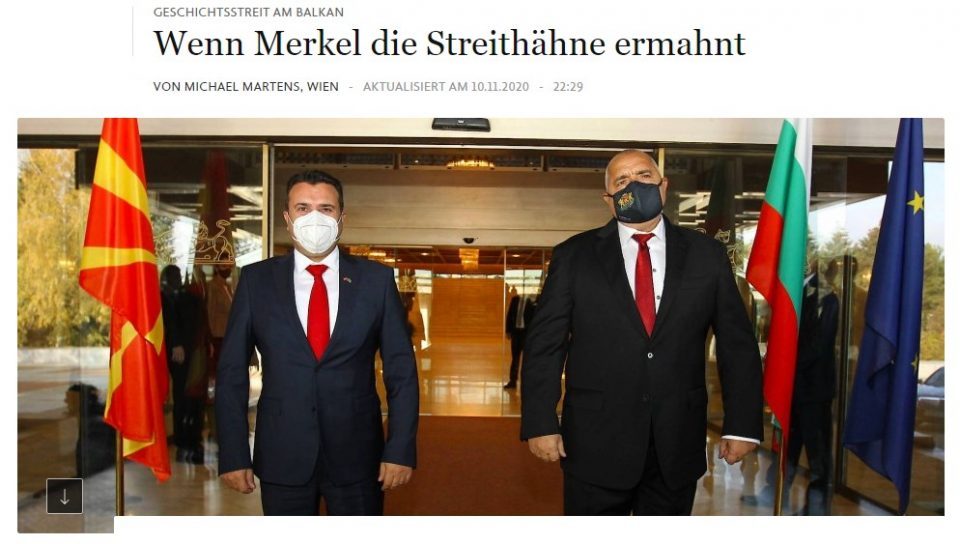Bulgaria’s insistence on controversial historical issues as a condition for Macedonia’s EU integration could jeopardize the entire EU enlargement policy, writes the German newspaper Frankfurter Allgemeine Zeitung.
In this part of Europe where historical disputes are overestimated, the EU’s enlargement policy will come to an end if the requirements for a bilateral historic dispute agreement become a precondition for the start of accession negotiations. Because all EU member states in the wider region (Greece, Bulgaria, Romania, Hungary and Croatia) are in conflict with candidate countries on one or another historical issue. It is about territories, the outcome and course of wars, the assessment of historical figures, the existence or non-existence of various minorities. If an agreement on such controversial issues becomes an accession criterion, the enlargement policy in the Balkans will end, writes FAZ.
The Bulgarian threat to block Macedonia, according to the German newspaper, overshadowed the Western Balkans Summit within the Berlin Process, which was co-chaired yesterday by the Prime Ministers of the two countries Boyko Borisov and Zoran Zaev.
Berlin, which as the current chair of the EU Council wants to open accession talks with Macedonia and Albania in December, has been trying for weeks to mediate the dispute at the highest level. The German President Frank-Walter Steinmeier, Chancellor Angela Merkel and Foreign Minister Heiko Maas intervened to reach a compromise and persuade Bulgaria to withdraw its veto threat, FAZ said.

Chancellor Merkel said at the Sofia Summit that one of the goals of the Berlin Process is reconciliation, by overcoming historical tensions. According to the newspaper, as a school teacher, she warned the two prime ministers to end the dispute, telling them: “In the region, you have to say yes: Reach an agreement! “This is very important.”
On Tuesday, it was uncertain whether these warnings would be successful. We heard from Skopje that the prospects are bad. Bulgaria maintains its position that Macedonia can start accession negotiations only if it adopts the Bulgarian state interpretation of “common history”. Bulgaria already informed the EU in early November that under the current conditions it will not agree to start accession negotiations, writes FAZ.
From the point of view of Bulgaria – at least as far as it is spread by historians close to the state and the government – the Macedonians are an “invented nation”. Sofia urges Skopje to publicly state that there is no Macedonian minority in Bulgaria, and must acknowledge that the Macedonian identity and language have Bulgarian roots. This position has been criticized by leading Bulgarian historians and linguists, who in an open letter to the government assessed it as inappropriate and even ridiculous, but that, according to the newspaper, did not affect the government in Sofia.
Minister Ekaterina Zaharieva complained to Reuters about Skopje’s “endless claims” about the existence of a Macedonian minority in Bulgaria and failure to recognize “current realities” and “historical truth”.
However, neither Zaev nor members of his office have made public statement over the Macedonian minority in Bulgaria. Macedonia said that in the 21st century in Europe it is not up to the states to decide which minorities are allowed and which are not. An unofficial compromise proposal envisions Skopje acknowledging in writing that the Macedonian language, as it is spoken in Macedonia today, was codified after the end of World War II. Although this fact in itself is indisputable, on Tuesday it was not clear whether it is possible to bring Sofia and Skopje closer, writes Frankfurter Allgemeine Zeitung.





Comments are closed for this post.